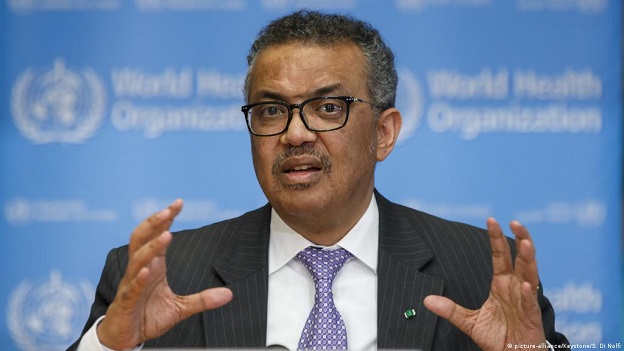
WHO issues holiday warning over Omicron
The World Health Organization has urged people to cancel some of their holiday plans to protect public health as the Omicron variant spreads globally.
"An event cancelled is better than a life cancelled," said WHO head Dr Tedros Adhanom Ghebreyesus, adding that "difficult decisions" must be made.
"In some cases, that will mean cancelling or delaying events" he said.
He added that there was now "evidence that Omicron is spreading significantly faster than... Delta".
Dr Tedros' comments come as a number of countries - including France and Germany - have tightened Covid restrictions and imposed travel curbs to try to halt the spread of the new variant. The Netherlands has introduced a strict lockdown over the Christmas period.
The White House said on Monday that President Joe Biden was not planning on "locking the country down". The country's top infectious disease expert, Dr Anthony Fauci, earlier warned that Christmas travel would increase the spread of Omicron even among the fully vaccinated.
The US Centers for Disease Control and Prevention (CDC) and the State Department have advised Americans against travel to eight places including Spain, Finland, Chad and Lebanon.
Bonaire, Monaco, San Marino and Gibraltar have also been added to its Level 4: Very High classification.
Omicron is now the dominant strain in the US, health experts say.
In the UK, Prime Minister Boris Johnson said on Monday that the government needed to "reserve the possibility" of bringing in new rules in England as Omicron cases surged, but did not announce further restrictions.
New Year's Eve celebrations in London's Trafalgar Square have been cancelled "in the interests of public safety", Mayor Sadiq Khan said.
Omicron - first detected in South Africa in November - has been classed as a "variant of concern" by the WHO.
Speaking at a briefing on Monday, Dr Tedros said: "All of us sick of this pandemic. All of us want to spend time with friends and family. All of us want to get back to normal.
"The fastest way to do this is for all of us, leaders and individuals, to make the difficult decisions that must be made to protect ourselves and others.
"In some cases, that will mean cancelling or delaying events... It's better to cancel now and celebrate later than to celebrate now and grieve later."
Dr Tedros also stressed that the pandemic could be ended in 2022 by ensuring that 70% of the population in every country of the world was vaccinated by the middle of next year.
He also said China, where the outbreak is believed to have started in 2019, must be forthcoming with relevant data and information.
"We need to continue until we know the origins, we need to push harder because we should learn from what happened this time in order to [do] better in the future," Dr Tedros said.
Meanwhile, WHO chief scientist Soumya Swaminathan said on Monday that it would be "unwise" to conclude from early evidence that Omicron was a milder variant that previous ones.
She warned that "with the numbers going up, all health systems are going to be under strain".
Credit: The BBC
